词形词性变化
高中英语2024高考复习词形词性变化汇总(共九组)
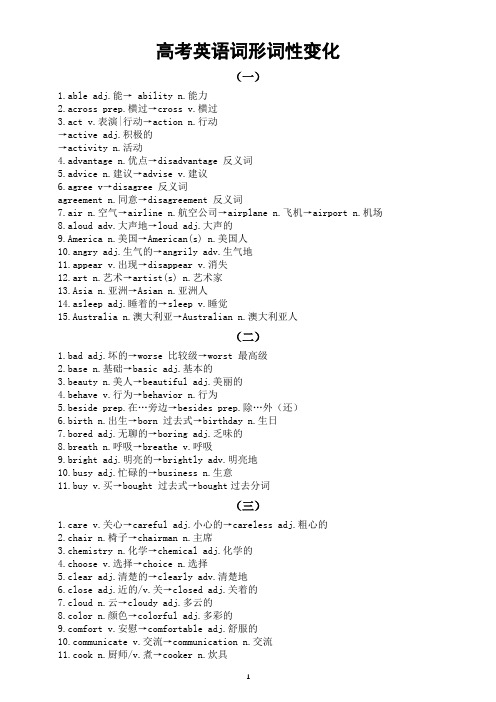
高考英语词形词性变化(一)1.able adj.能→ ability n.能力2.across prep.横过→cross v.横过3.act v.表演|行动→action n.行动→active adj.积极的→activity n.活动4.advantage n.优点→disadvantage 反义词5.advice n.建议→advise v.建议6.agree v→disagree 反义词agreement n.同意→disagreement 反义词7.air n.空气→airline n.航空公司→airplane n.飞机→airport n.机场8.aloud adv.大声地→loud adj.大声的9.America n.美国→American(s) n.美国人10.angry adj.生气的→angrily adv.生气地11.appear v.出现→disappear v.消失12.art n.艺术→artist(s) n.艺术家 n.亚洲→Asian n.亚洲人14.asleep adj.睡着的→sleep v.睡觉15.Australia n.澳大利亚→Australian n.澳大利亚人(二)1.bad adj.坏的→worse 比较级→worst 最高级2.base n.基础→basic adj.基本的3.beauty n.美人→beautiful adj.美丽的4.behave v.行为→behavior n.行为5.beside prep.在…旁边→besides prep.除…外(还)6.birth n.出生→born 过去式→birthday n.生日7.bored adj.无聊的→boring adj.乏味的8.breath n.呼吸→breathe v.呼吸9.bright adj.明亮的→brightly adv.明亮地10.busy adj.忙碌的→business n.生意11.buy v.买→bought 过去式→bought过去分词(三)1.care v.关心→careful adj.小心的→careless adj.粗心的2.chair n.椅子→chairman n.主席3.chemistry n.化学→chemical adj.化学的4.choose v.选择→choice n.选择5.clear adj.清楚的→clearly adv.清楚地6.close adj.近的/v.关→closed adj.关着的7.cloud n.云→cloudy adj.多云的8.color n.颜色→colorful adj.多彩的fort v.安慰→comfortable adj.舒服的municate v.交流→communication n.交流11.cook n.厨师/v.煮→cooker n.炊具12.correct adj.正确的→correctly adv.正确地13.courage n.勇气→encourage v.鼓励→discourage v.阻止(四)1.day n.天→daily adj.日常的2.danger n.危险→dangerous adj.有危险的3.die v.死→died 死(过去式)→dead adj.死了的→dying adj. 快死了的→death n.死亡4.decide v.决定→decision n.决定5.develop v.发展→developed adj.发达的→developing adj.发展中的6.different adj.不同的→difference n.不同点7.difficult adj.难的→difficulty n.困难8.direct adj.直接的/v.指导→indirect adj.间接的→director n.导演→director n.方向9.discover v.发现→cover v.覆盖→discovery n.发现10.discuss v.讨论→discussion n.讨论11.draw v.画→drawer n.抽屉12.drive v.开车→driver n.司机(五)1.east n.东方/adj.东方的→eastern adj.东方的2.easy adj.容易的→easily adv.容易地cate v.教育→education n.教育4.eight num.八→eighteen num.十八→eighth num.第八→eighty num.八十5.electric adj.电动的→electricity n.电→electronic n.电子6.Europe n.欧洲→European adj.欧洲的7.excite v.使兴奋→excited adj.兴奋的→exciting adj.令人兴奋的8.express v.表达→expression n.表达→expressive adj.富有表现力的(六)1.fall v.落→fell 过去式→fallen 过去分词2.far adj.远的→farther 比较级→farthest 最高级3.farm n.农场→farmer n.农民4.fat adj.胖的→fatter 比较级5.feel v.感觉→feeling n.感觉6.five num.五→fifth num.第五→fifty num.五十7.fill v.填满→filled adj.充满的8.first num.第一→one num.一→once 一次9.fly v.飞→flight n.飞行/航班10.foreign adj.外国的→foreigner n.外国人11.friend n.朋友→friendly adj.友好的→friendship n.友谊12.fun n.兴趣→funny adj.有趣的(七)1.half n一半→halves n (复数)2.happy adj 高兴的→happily 高兴地→happiness n 幸福/快乐3.health n 健康→healthy adj 健康的4.hear v 听见→heard v (过去式)→ heard(过去式)5.heavy adj 重的→heavily adv 重地6.high adj 高的→height n 高度7.help v 帮助→helpful adj 有帮助的8.hero n 英雄→heroes (复数)9.hide v 隐藏→hide(过去式)→hidden(过去分词)10.he pron 他→him他(宾)→his他的→himself他自己11.hold v 举行→held 过去式→held过去分词12.home n 家→homeless adj.无家可归的13.hope v.n 希望→hopeful adj 有希望的→hopeless adj. 无望的14.hunger n 饥饿→hungry adj 饥饿的(八)1.ill adj 有病的→illness n 疾病2.important adj重要的→importance n重要性3.impossible adj 不可能的→possible adj 可能的4.invent v发明→inventor n 发明家→invention n发明物5.interest n 兴趣→interesting adj 有趣的→interested adj 感兴趣的6.introduce v 介绍→introduction n 介绍7.invite v 邀请→invitation n 邀请8.kind adj 善良的 n 种类→kindness n 善良9.knife n 小刀→knives (复数)10.know v 知道→knew 过去式→known 过去分词→knowledge n 知识(九)1. lay v 放置→laid过去式→laid过去分词2.lead.v领导→leader.n.领导人3.leaf.n.叶子→leaves. 复数4.little.adj.少→less比较级→least最高级5.lie.躺→lay过去式→lain过去分词6.live.v生活→life n.生活→lively adj.活泼的7.lose.v.丢失→lost过去式→lost过去分词8.love.v.爱→lovely adj.可爱的9.luck.n.运气→lucky adj.好运的→unlucky adj.不幸的→luckily adv.幸运地→unluckily adv.不幸地。
英语单词词性转变的一般规律
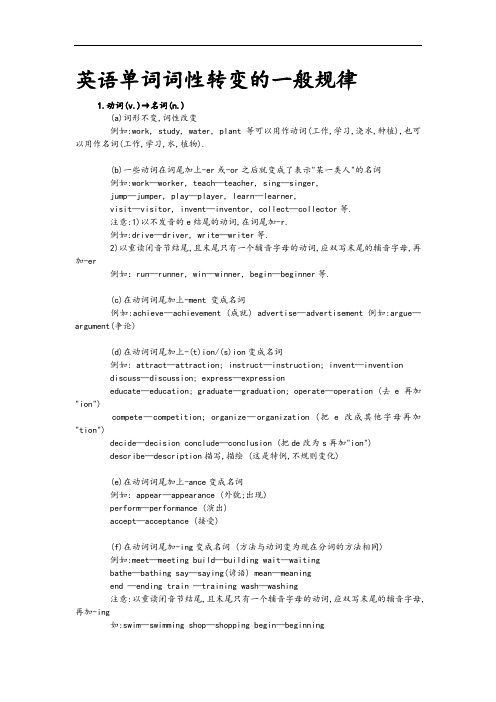
英语单词词性转变的一般规律1.动词(v.)→名词(n.)(a)词形不变,词性改变例如:work, study, water, plant等可以用作动词(工作,学习,浇水,种植),也可以用作名词(工作,学习,水,植物).(b)一些动词在词尾加上-er或-or之后就变成了表示"某一类人"的名词例如:work—worker, teach—teacher, sing—singer,jump—jumper, play—player, learn—learner,visit—visitor, invent—inventor, collect—collector等.注意:1)以不发音的e结尾的动词,在词尾加-r.例如:drive—driver, write—writer等.2)以重读闭音节结尾,且末尾只有一个辅音字母的动词,应双写末尾的辅音字母,再加-er例如:run—runner, win—winner, begin—beginner等.(c)在动词词尾加上-ment 变成名词例如:achieve—achievement (成就) advertise—advertisement例如:argue—argument(争论)(d)在动词词尾加上-(t)ion/(s)ion变成名词例如: attract—attraction; instruct—instruction; invent—inventiondiscuss—discussion; express—expressioneducate—education; graduate—graduation; operate—operation (去e再加"ion")compete—competition; organize—organization (把e改成其他字母再加"tion")decide—decision conclude—conclusion (把de改为s再加"ion")describe—description描写,描绘 (这是特例,不规则变化)(e)在动词词尾加上-ance变成名词例如: appear—appearance (外貌;出现)perform—performance (演出)accept—acceptance (接受)(f)在动词词尾加-ing变成名词 (方法与动词变为现在分词的方法相同)例如:meet—meeting build—building wait—waitingbathe—bathing say—saying(谚语) mean—meaningend —ending train —training wash—washing注意:以重读闭音节结尾,且末尾只有一个辅音字母的动词,应双写末尾的辅音字母,再加-ing如:swim—swimming shop—shopping begin—beginning(g)其他一些比较特殊的变化例如: Beg(乞讨)—beggar(乞丐) behave(行为举止)—behaviorknow(知道)—knowledge(知识) fly—flight (飞行)heat (加热)—heat(热量) hit (撞击)—hit( 轰动一时的人或物,碰撞)mix (混合)—mixture(混合物) press(按,压)—pressure(压力)sit(坐)—seat (座位) succeed—success(成功)tour—tour(旅游)/ tourist (游客)2.动词(v.)→形容词(adj.)(a)动词后面加able,以e结尾的动词则去e加able,表示具有此性质,特点或属性.例如: afford-affordable;love-lovable(b)动词后面加ed,以e结尾的动词则直接加d,表示被动性的属性或特点.例如: scatter-scattereduse-used(c)不规则的动词则必须记忆,记住其过去分词形式.规律不大,意义同(b).3.名词(n.)→形容词(adj.)(a)在名词后面加-y可以变成形容词(尤其是一些与天气有关的名词)例如: rain—rainy, cloud—cloudy, wind—windy, snow—snowy,health—healthy, luck—lucky, anger—angry guilt—guilty(内疚的)tourist—touristy(游客多的) , salt (盐)—salty (咸的)silk(丝绸)—silky(丝绸般的), sleep—sleepy (昏昏欲睡的)注意:1)如果以重读闭音节结尾,且词尾只有一个辅音字母,这时应双写辅音字母再加"-y".如: sun—sunny, fun—funny, fog—foggy(有雾的), fur—furry(毛皮的)2)少数以不发音的e结尾的名词变为形容词时,应去掉e再加"-y".如: noise—noisy, ice—icy, shine—shiny(发亮的), taste(口味)—tasty(甜的)(b)名词后面加-ed,以e结尾的直接加d.例如: spot(斑点)—spotted(有斑点的); talent—talented (有天赋的)organize—organized 有组织的; balance—balanced(平衡的)(c)一些抽象名词在词尾加-ful可以变为形容词例如:care—careful, thank—thankful, help—helpful,use—useful, meaning—meaningful(d)在名词后加-less构成含有否定意义的形容词例如:care—careless(粗心的), use—useless(无用的)hope—hopeless(没希望的),home—homeless(无家可归的)(e)一些以-ce结尾的名词,把-ce改为-t变成形容词例如: difference—different, silence—silent, confidence—confident(f).在名词后加-ly变为形容词例如: friend—friendly, love—lovely, live---lively(g).在名词后加-ous变为形容词例如: danger—dangerous(h)名词后面加-al变为形容词例如: music—musical; medicine—medical (这个比较特殊)(i)名词后面加-able变为形容词,如果以e结尾就去e再加"-able".例如: adjust—adjustable 可调整的value—valuable有价值的(j)名词后面加-en变成形容词例如: wood—wooden 木制的wool—woolen 羊毛的(k)一些表示国家的名词可以在词尾加-ese, -ish或-n构成表示国籍,语言的形容词例如:China—Chinese, Japan—Japanese, England—English,America—American, India—Indian, Australia —Australian(注意Canada—Canadian)4..形容词(adj.)→副词(adv.)▲一般在形容词的词尾加-ly可以变成副词例如: quick—quickly, slow—slowly, loud—loudly, sudden—suddenly 等但是,以下几点值得注意:(a) 一些以"辅音字母+y"结尾的形容词,要把y改为i再加-ly例如: happy—happily, angry—angrily, lucky—luckily, heavy—heavily, noisy—noisily(b) 有些以-ble或-le结尾的形容词,去掉e加-y例如:possible—possibly, terrible—terribly(c)少数以e结尾的形容词,要去掉e再加-ly例如: true—truly但绝大多数以e结尾的形容词仍然直接加-ly 例如: polite—politely, wide—widely(d)以-l结尾的形容词变为副词时要在词尾加-ly,以--ll结尾的才在词尾只加-y.例如: usual—usually, careful—carefully, useful—usefullyfull—fully (以-ll结尾的才只加y)英语词汇后缀系列(一)——形容词后缀able以“-able”结尾的形容词一般有两种情况:(1)v.+able→adj. 以这种方式构成的形容词其意义为“能……的”、“可以(被)……的”、“适合于……的”、“值得……的”等,即有被动含义。
高中英语高考词性转换汇总(5类词形转换+7组核心词汇转换)

高考英语词性转换一、词形转换(一)形容词→副词形容词变副词的一般情况1.(2019·全国Ⅱ卷)final最终的→finally终于2.(2018·全国Ⅱ卷、2014·全国Ⅰ卷)actual真实的→actually 实际上3.(2016·全国Ⅰ卷)official正式的→officially正式地4.(2016·全国Ⅲ卷)gradual逐渐的→gradually 逐渐地tips:关于形容词词尾l,同学们怕是有很多误会,要知道变副词时:"ll"结尾加-y,如full→fully,dull→dully;"le"结尾e改y, 高中阶段只有whole→wholly是例外。
记住以上两点,千万别看到l就加y!5.(2020全国Ⅲ卷)gentle温和的→gently 温和地6.(2019·全国Ⅲ卷)huge巨大的→hugely极度;非常,深深地tips:形变副规律中"元音字母+e"去e加-ly,关于这点只要记住高中阶段的true→truly,注意“辅音字母+e”变副词,不可去掉e!7.(2021年1月浙江卷)sharp锋利的→sharply明显地8.(2020年1月浙江卷)particular特别的→particularly尤其9.(2020全国Ⅰ卷)extreme极度的→extremely非常地10.(2019·全国Ⅰ卷)poor贫穷的,贫乏的→poorly不足11.(2017·全国Ⅱ卷)fair相当大的→fairly相当地12.(2017·全国Ⅲ卷)certain确定→certainly无疑,确定13.(2016·全国Ⅱ卷、2015·全国Ⅰ卷)regular有规律的→regularly有规律地14.(2015·全国Ⅱ卷)slow慢的→slowly 缓慢地15.(2014·全国Ⅱ卷)sudden突然的→suddenly 突然16.(2021八省联考)specific——specificallytips:除了上述规则外,还要记住它:1.以y结尾的形容词:"辅音字母+y"改i加-ly,如:merry→merrily;如果y的读音同“爱”,直接加-ly,如:shy→shyly。
高中词性及词形转换
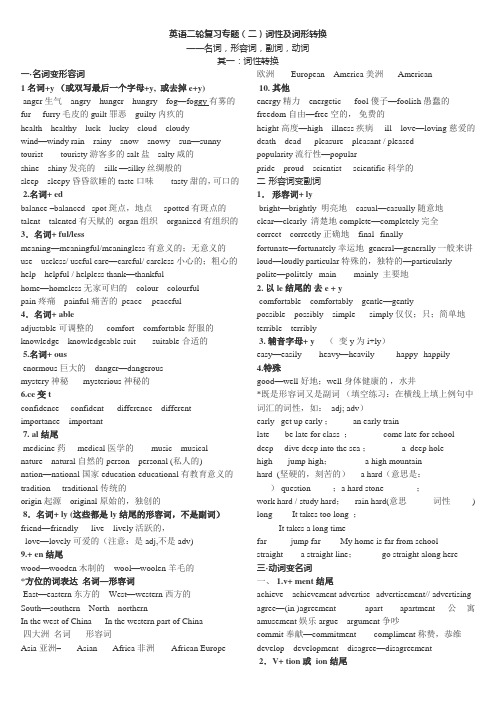
英语二轮复习专题(二)词性及词形转换——名词,形容词,副词,动词其一:词性转换一·名词变形容词1名词+y (或双写最后一个字母+y, 或去掉e+y)anger 生气---angry hunger---hungry fog—foggy有雾的fur----furry 毛皮的guilt 罪恶---guilty 内疚的health---healthy luck---lucky cloud---cloudy wind—windy rain---rainy snow---snowy sun—sunny tourist------touristy 游客多的salt 盐-- salty 咸的shine---shiny 发亮的silk —silky 丝绸般的sleep---sleepy 昏昏欲睡的taste 口味------tasty 甜的,可口的2.名词+ edbalance –balanced spot 斑点,地点----spotted 有斑点的talent---talented 有天赋的organ组织---organized 有组织的3.名词+ ful/lessmeaning—meaningful/meaningless 有意义的;无意义的use---useless/ useful care—careful/ careless 小心的;粗心的help---helpful / helpless thank—thankful home—homeless 无家可归的colour---colourfulpain 疼痛---painful 痛苦的peace -- peaceful4.名词+ ableadjustable 可调整的comfort---comfortable舒服的knowledge---knowledgeable suit -----suitable 合适的5.名词+ ousenormous 巨大的danger—dangerousmystery 神秘-----mysterious 神秘的6.ce 变 tconfidence----confident difference---different importance---important7. al 结尾medicine 药----medical 医学的music---musical nature---natural 自然的person---personal (私人的) nation—national 国家education-educational有教育意义的tradition----traditional 传统的origin起源---original 原始的,独创的8.名词+ ly (这些都是ly结尾的形容词,不是副词)friend—friendly live---lively 活跃的,love—lovely 可爱的(注意:是adj,不是adv)9.+ en 结尾wood—wooden 木制的wool—woolen 羊毛的*方位的词表达名词—形容词East—eastern东方的West—western西方的South—southern North---northernIn the west of China In the western part of China四大洲名词-----形容词Asia 亚洲–---- Asian Africa 非洲----- African Europe 欧洲----- European America 美洲-----American10. 其他energy精力---energetic fool 傻子—foolish 愚蠢的freedom 自由—free 空的,免费的height 高度—high illness 疾病--- ill love—loving 慈爱的death---dead pleasure---pleasant / pleasedpopularity 流行性—popularpride---proud scientist----scientific 科学的二·形容词变副词1.形容词+ lybright—brightly 明亮地casual—casually 随意地clear—clearly 清楚地complete—completely 完全correct---correctly 正确地final--finally fortunate—fortunately幸运地general—generally 一般来讲loud—loudly particular 特殊的,独特的—particularly polite—politely main------mainly 主要地2. 以le 结尾的去e + ycomfortable---comfortably gentle—gentlypossible---possibly simple ----simply 仅仅;只;简单地terrible---terribly3. 辅音字母+ y (变y为i+ly)easy—easily heavy—heavily happy--happily4.特殊good—well好地;well 身体健康的,水井*既是形容词又是副词(填空练习:在横线上填上例句中词汇的词性,如:adj; adv)early get up early ;____ an early train____late be late for class ;___ come late for school____ deep dive deep into the sea ;____ a deep hole_____ high jump high;______ a high mountain________ hard (坚硬的,刻苦的) a hard(意思是:___) question_____;a hard stone_______ ;work hard / study hard;___rain hard(意思______词性_____) long It takes too long ;_____It takes a long time_______far jump far ___My home is far from school _____ straight a straight line;_____go straight along here____ 三·动词变名词一、1.v+ ment 结尾achieve---achievement advertise--advertisement// advertising agree—(in )agreement apart------apartment 公寓amusement 娱乐argue---argument争吵commit奉献—commitment compliment 称赞,恭维develop---development disagree—disagreement2.V+ tion或ion 结尾attract吸引—attraction(s) conclude—conclusion 结论compete—competition 竞争,比赛discuss—discussion 讨论educate-----education describe—description描写,描绘suggest-建议,暗示-suggestion solve解决-solution 解决方法 3.V+ ance 结尾appear—appearance 外,出现perform--performance 演出4.V+ ing 结尾bathe 洗澡---bathing end 结束----ending 结尾,结局train 训练---training mean---meaning 意义say-----saying 谚语5.V+ 其他Beg(乞讨)—beggar 乞丐behave 行为,举止----behavior know---knowledge fly—flight 飞行heat 加热---heat 热量hit 撞击------hit 轰动一时的人或物,碰撞mix 混合-----mixture 混合物press 按,压—pressure 压力sit-----seat 座位succeed-- successtour 在-----旅游,在-----作巡回演出直接+地点,如:tour China ---tourism旅游/ tourist 游客其二·词形变化除了上述词性转换,一个单词的词形还可以通过以下方式来发生改变(顺便词性或词义也发生了变化):一·名词的单复数变形1.规则的可数名词的复数变化:1).一般情况加s :book-- books mouth---mouths house---houses girl---girls2).以s 、sh 、ch 、x结尾的加es :class--- classes box----boxes match----matches3).辅音字母+ y结尾的变y为i加es:city---cities country----countries party----parties factory----factories 4).以o 结尾的词+es的只有以下词:heroes Negroes;tomatoes;potatoes5) .以f,fe 结尾的变f或fe为v +es :thief wife life knife wolf half leaf2. 不规则的变化1).man—men, woman—women, tooth—teeth, foot—feet, goose—geese , child—children, mouse—mice, phenomenon---phenomena, crisis---crises; criterion---criteria 2).单复数相同: sheep, deer, fish, Chinese, Japanese , Swiss, craft, means, series, species3).以man, woman 修饰名词构成合成词时,两个词都变化.a man servant—three men servants 但boy与girl不要变化a girl student---three girl students4) 合成词的单数变复数,一般在词尾加-s/-es,如有名词作为中心词,则加在该名词后。
英语词性的分类及变换规则
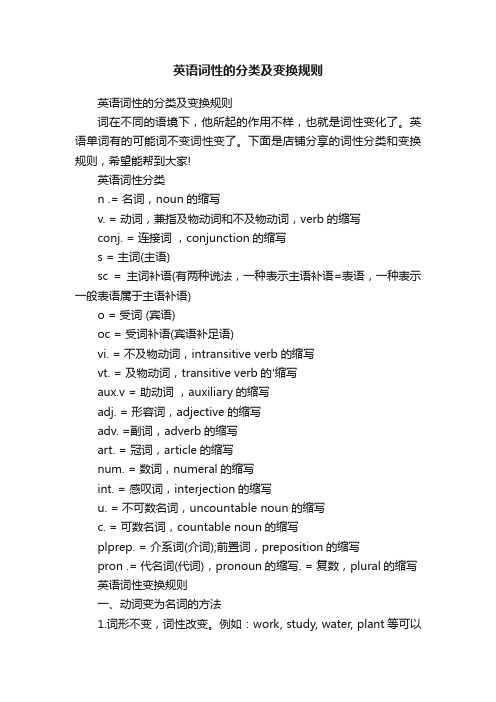
英语词性的分类及变换规则英语词性的分类及变换规则词在不同的语境下,他所起的作用不样,也就是词性变化了。
英语单词有的可能词不变词性变了。
下面是店铺分享的词性分类和变换规则,希望能帮到大家!英语词性分类n .= 名词,noun的缩写v. = 动词,兼指及物动词和不及物动词,verb的缩写conj. = 连接词,conjunction的缩写s = 主词(主语)sc = 主词补语(有两种说法,一种表示主语补语=表语,一种表示一般表语属于主语补语)o = 受词 (宾语)oc = 受词补语(宾语补足语)vi. = 不及物动词,intransitive verb的缩写vt. = 及物动词,transitive verb的'缩写aux.v = 助动词,auxiliary的缩写adj. = 形容词,adjective的缩写adv. =副词,adverb的缩写art. = 冠词,article的缩写num. = 数词,numeral的缩写int. = 感叹词,interjection的缩写u. = 不可数名词,uncountable noun的缩写c. = 可数名词,countable noun的缩写plprep. = 介系词(介词);前置词,preposition的缩写pron .= 代名词(代词),pronoun的缩写. = 复数,plural的缩写英语词性变换规则一、动词变为名词的方法1.词形不变,词性改变。
例如:work, study, water, plant等可以用作动词,也可以用作名词。
2. 一些动词在词尾加上-er或-or之后就变成了表示“某一类人”的名词。
例如:work—worker, teach—teacher, sing—singer, jump—jumper, play—player, learn—learner, visit—visitor, invent—inventor等。
注意:1)以不发音的e结尾的动词,在词尾加-r。
词性转换的技巧
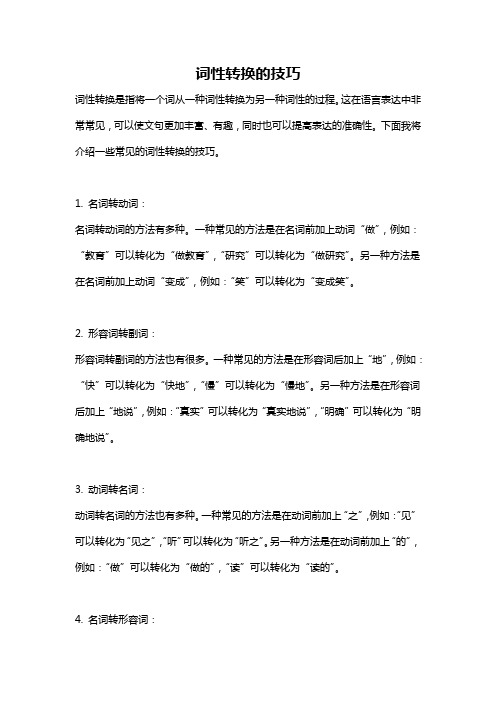
词性转换的技巧词性转换是指将一个词从一种词性转换为另一种词性的过程。
这在语言表达中非常常见,可以使文句更加丰富、有趣,同时也可以提高表达的准确性。
下面我将介绍一些常见的词性转换的技巧。
1. 名词转动词:名词转动词的方法有多种。
一种常见的方法是在名词前加上动词“做”,例如:“教育”可以转化为“做教育”,“研究”可以转化为“做研究”。
另一种方法是在名词前加上动词“变成”,例如:“笑”可以转化为“变成笑”。
2. 形容词转副词:形容词转副词的方法也有很多。
一种常见的方法是在形容词后加上“地”,例如:“快”可以转化为“快地”,“慢”可以转化为“慢地”。
另一种方法是在形容词后加上“地说”,例如:“真实”可以转化为“真实地说”,“明确”可以转化为“明确地说”。
3. 动词转名词:动词转名词的方法也有多种。
一种常见的方法是在动词前加上“之”,例如:“见”可以转化为“见之”,“听”可以转化为“听之”。
另一种方法是在动词前加上“的”,例如:“做”可以转化为“做的”,“读”可以转化为“读的”。
4. 名词转形容词:名词转形容词的方法有多种。
一种常见的方法是在名词后加上“的”,例如:“困难”可以转化为“困难的”,“美丽”可以转化为“美丽的”。
另一种方法是在名词前加上“具有”,例如:“价值”可以转化为“具有价值的”,“特点”可以转化为“具有特点的”。
5. 副词转动词:副词转动词的方法也有多种。
一种常见的方法是在副词后加上动词“做”,例如:“迅速”可以转化为“迅速做”,“安静”可以转化为“安静做”。
另一种方法是在副词后加上动词“变成”,例如:“成形”可以转化为“变成成形”,“明亮”可以转化为“变成明亮”。
6. 状语转形容词:状语转形容词的方法也有多种。
一种常见的方法是在状语前加上形容词“是”,例如:“完全”可以转化为“是完全的”,“不可避免”可以转化为“是不可避免的”。
另一种方法是在状语前加上形容词“之”,例如:“明显”可以转化为“之明显”,“难以置信”可以转化为“之难以置信”。
高中英语-词性规律(前缀+后缀)
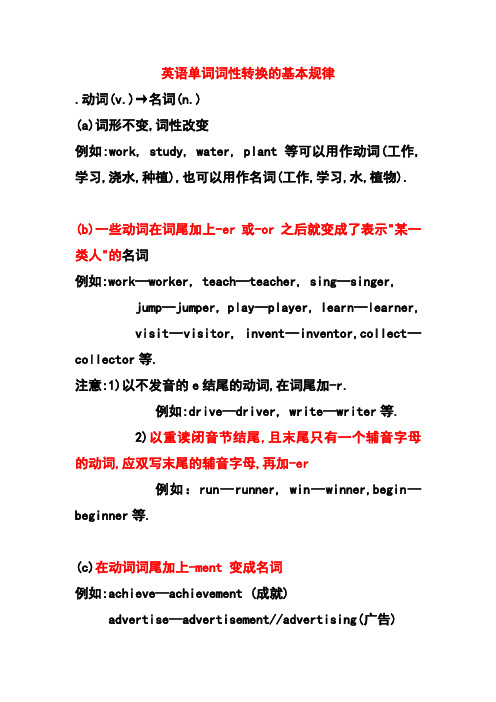
英语单词词性转换的基本规律.动词(v.)→名词(n.)(a)词形不变,词性改变例如:work, study, water, plant等可以用作动词(工作,学习,浇水,种植),也可以用作名词(工作,学习,水,植物).(b)一些动词在词尾加上-er或-or之后就变成了表示"某一类人"的名词例如:work—worker, teach—teacher, sing—singer,jump—jumper, play—player, learn—learner, visit—visitor, invent—inventor,collect—collector等.注意:1)以不发音的e结尾的动词,在词尾加-r.例如:drive—driver, write—writer等.2)以重读闭音节结尾,且末尾只有一个辅音字母的动词,应双写末尾的辅音字母,再加-er例如:run—runner, win—winner,begin—beginner等.(c)在动词词尾加上-ment 变成名词例如:achieve—achievement (成就)advertise—advertisement//advertising(广告)agree—agreement disgree—disagreement amuse—amusement (娱乐) improve—improvement(争吵)commit(奉献)—commitment develop—development(发展)depart—department (局,部) govern(统治)—government(政府)manage—management (管理) equip—equipment(装备)有些单词比较特殊,需把动词后的e去掉再加ment.例如:argue—argument(争论)(d)在动词词尾加上-(t)ion/(s)ion变成名词例如: attract—attraction; instruct—instruction;invent—invention discuss—discussion;express—expression educate—education;graduate—graduation; operate—operation (去e再加"ion")compete—competition; organize—organization (把e改成其他字母再加"tion")decide—decision conclude—conclusion (把de改为s再加"ion")describe—description描写,描绘 (这是特例,不规则变化)(e)在动词词尾加上-ance变成名词例如: appear—appearance (外貌;出现)perform—performance (演出)accept—acceptance (接受)(f)在动词词尾加-ing变成名词 (方法与动词变为现在分词的方法相同)例如:meet—meeting build—building wait—waitingbathe—bathing say—saying(谚语) mean—meaningend —ending train —training wash—washing注意:以重读闭音节结尾,且末尾只有一个辅音字母的动词,应双写末尾的辅音字母,再加-ing如:swim—swimming shop—shopping begin—beginning(g)其他一些比较特殊的变化例如: Beg(乞讨)—beggar(乞丐) behave(行为举止)—behaviorknow(知道)—knowledge(知识) fly—flight (飞行)heat (加热)—heat(热量) hit (撞击)—hit( 轰动一时的人或物,碰撞)mix (混合)—mixture(混合物) press(按,压)—pressure(压力)sit(坐)—seat (座位) succeed—success(成功)tour—tour(旅游)/ tourist (游客)2.动词(v.)→形容词(adj.)(a)动词后面加able,以e结尾的动词则去e加able,表示具有此性质,特点或属性.例如: afford-affordable;love-lovable(b)动词后面加ed,以e结尾的动词则直接加d,表示被动性的属性或特点.例如: scatter-scattered use-used(c)不规则的动词则必须记忆,记住其过去分词形式.规律不大,意义同(b).3.名词(n.)→形容词(adj.)(a)在名词后面加-y可以变成形容词(尤其是一些与天气有关的名词)例如: rain—rainy, cloud—cloudy, wind—windy, snow —snowy,health—healthy, luck—lucky,anger—angry guilt—guilty(内疚的)tourist—touristy(游客多的) , salt (盐)—salty (咸的)silk(丝绸)—silky(丝绸般的), sleep—sleepy (昏昏欲睡的)注意:1)如果以重读闭音节结尾,且词尾只有一个辅音字母,这时应双写辅音字母再加"-y".如: sun—sunny, fun—funny, fog—foggy(有雾的), fur—furry(毛皮的)2)少数以不发音的e结尾的名词变为形容词时,应去掉e再加"-y".如: noise—noisy, ice—icy, shine—shiny(发亮的), taste(口味)—tasty(甜的)(b)名词后面加-ed,以e结尾的直接加d.例如: spot(斑点)—spotted(有斑点的); talent—talented (有天赋的)organize—organized 有组织的; balance—balanced(平衡的)(c)一些抽象名词在词尾加-ful可以变为形容词例如:care—careful, thank—thankful, help—helpful,use—useful, meaning—meaningful(d)在名词后加-less构成含有否定意义的形容词例如:care—careless(粗心的), use—useless(无用的) hope—hopeless(没希望的),home—homeless(无家可归的)(e)一些以-ce结尾的名词,把-ce改为-t变成形容词例如: difference—different, silence—silent, confidence—confident(f).在名词后加-ly变为形容词例如: friend—friendly, love—lovely, live---lively(g).在名词后加-ous变为形容词例如: danger—dangerous(h)名词后面加-al变为形容词例如: music—musical; medicine—medical (这个比较特殊)(i)名词后面加-able变为形容词,如果以e结尾就去e再加"-able".例如: adjust—adjustable 可调整的 value—valuable有价值的(j)名词后面加-en变成形容词例如: wood—wooden 木制的 wool—woolen 羊毛的(k)一些表示国家的名词可以在词尾加-ese, -ish或-n构成表示国籍,语言的形容词例如:China—Chinese, Japan—Japanese, England—English,America—American, India—Indian, Australia —Australian(注意Canada—Canadian)4..形容词(adj.)→副词(adv.)▲一般在形容词的词尾加-ly可以变成副词例如: quick—quickly, slow—slowly, loud—loudly, sudden—suddenly 等但是,以下几点值得注意:(a) 一些以"辅音字母+y"结尾的形容词,要把y改为i再加-ly例如: happy—happily, angry—angrily, lucky—luckily, heavy—heavily, noisy—noisily(b) 有些以-ble或-le结尾的形容词,去掉e加-y例如:possible—possibly, terrible—terribly(c)少数以e结尾的形容词,要去掉e再加-ly例如: true—truly但绝大多数以e结尾的形容词仍然直接加-ly 例如:polite—politely, wide—widely(d)以-l结尾的形容词变为副词时要在词尾加-ly,以-ll结尾的才在词尾只加-y.例如: usual—usually, careful—carefully, useful—usefullyfull—fully (以-ll结尾的才只加y)1.英语26个字母中,a e i o u是元音字母, y是半元音字母, 其余都是辅音字母.★所谓半元音就是有时候做元音,有时候做辅音.半元音字母y做元音有: shy,sky做辅音比如最简单的:yes2.开音节和闭音节开音节分两种:绝对开音节和相对开音节绝对开音节指的是"元音字母结尾"的音节 (例如 we, hi 等)相对开音节是指"辅音字母-元音字母-辅音字母-不发音的e"的音节,(r除外). ( 例如,take,make等)比如:take (在这个单词中,t是辅音,a是元音,k是辅音,e 是不发音的元音)◆在开音节中, 元音字母发他们在字母表中的音闭音节, 则是指"辅音字母-元音字母-辅音字母"的音节( -al等除外) (例如:leg,cross等)◆在闭音节中,元音字母发不同的音a e i o u例 sat let sit not nut (试着读下这些单词,这些单词中,元音发的音都不是它们在字母表中发的音)2.英语重读闭音节就是以辅音因素结尾的,而且是重读音节的音节.比如apple 划音节就因该是ap/ple 前面那个ap是一个音节,这个音节以辅音因素p结尾,所以就是闭音节.(仅仅能看出是闭音节,是不是重读闭音节还要看这个音节是不是重读的)重读闭音节三要素:1. 必须是重读音节;2. 最后只有一个辅音字母;3.元音字母发短元音 ( 说通俗点,打个比方, /u/是短元音,/u:/是长元音)重读闭音节即两个辅音中间夹一个元音.如:sit---sitting begin---beginning(重读在gin这个音节上)●像travel这个单词,"vel"也是"辅音+元音+辅音"的结构,但是重音不在vel这个音节上,所以不用双写"l",可以为travelled,也可以是traveled,更常用的是后者.英语单词词根词缀和词性转换英语中常见的后缀一、名词性后缀1,-age为抽象名词后缀,表示行为,状态和全体总称percentage百分数,百分率,voltage电压,伏特数,lavage 灌洗,洗,出法,gavage管词法,curettage刮除法,shortage 不足,缺少。
词性转换规律
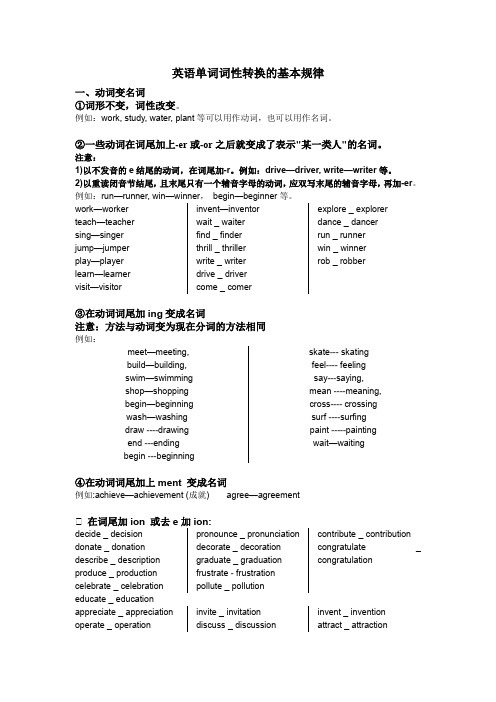
英语单词词性转换的基本规律一、动词变名词①词形不变,词性改变。
例如:work, study, water, plant等可以用作动词,也可以用作名词。
②一些动词在词尾加上-er或-or之后就变成了表示"某一类人"的名词。
注意:1)以不发音的e结尾的动词,在词尾加-r。
例如:drive—driver, write—writer等。
2)以重读闭音节结尾,且末尾只有一个辅音字母的动词,应双写末尾的辅音字母,再加-er。
例如:run—runner, win—winner,begin—beginner等。
work—worker teach—teacher sing—singer jump—jumper play—player learn—learner visit—visitor invent—inventorwait _ waiterfind _ finderthrill _ thrillerwrite _ writerdrive _ drivercome _ comerexplore _ explorerdance _ dancerrun _ runnerwin _ winnerrob _ robber③在动词词尾加ing变成名词注意:方法与动词变为现在分词的方法相同例如:meet—meeting, build—building, swim—swimming shop—shopping begin—beginning wash—washing draw ----drawing end ---ending begin ---beginning skate--- skating feel---- feeling say---saying, mean ----meaning, cross---- crossing surf ----surfing paint -----painting wait—waiting④在动词词尾加上ment 变成名词例如:achieve—achievement (成就) agree—agreement ⑤在词尾加ion 或去e加ion:decide _ decision donate _ donation describe _ description produce _ production celebrate _ celebration pronounce _ pronunciationdecorate _ decorationgraduate _ graduationfrustrate - frustrationpollute _ pollutioncontribute _ contributioncongratulate _congratulationeducate _ educationappreciate _ appreciation operate _ operation invite _ invitationdiscuss _ discussioninvent _ inventionattract _ attraction⑥其他一些比较特殊的变化know ---- knowledge please ---pleasure enjoy--- enjoyment practise--- practice die ---death succeed--- success weigh ---weight sit-- seatchange --chance enter --entrancefly --flightdiscover-- discovery appear-- appearance breathe-- breath二、名词变形容词①在名词后面加-y可以变成形容词(尤其是一些与天气有关的名词)例如: rain—rainy, cloud—cloudy, salt —salty sleep—sleepy注意:1)如果以重读闭音节结尾,且词尾只有一个辅音字母,这时应双写辅音字母再加"-y".如: sun—sunny, fun—funny, fog—foggy2)少数以不发音的e结尾的名词变为形容词时,应去掉e再加"-y".如: noise—noisy, ice—icy②名词后面加-ed,以e结尾的直接加d,表示被动性的属性或特点.talent—talented (有天赋的) use-usedplease - pleasedunite - unitedexcite - excitedclose - closedrelax - relaxed surprise - surprised, develop - developed interest - interested crowd - crowded pollute - polluted③一些抽象名词在词尾加-ful可以变为形容词use - useful care - careful, help - helpful, thank - thankful peace - peaceful, forget - forgetful, play - playful, succeed - successful, wonder - wonderful④在名词后加-less构成含有否定意义的形容词例如:care—careless, use—uselesshope—hopeless,home—homeless⑤一些以-ce结尾的名词,把-ce改为-t变成形容词例如: difference—different, silence—silent, confidence—confident ⑥在名词后加-ly变为形容词例如: friend—friendly, love—lovely, live---lively⑦在名词后加-ous变为形容词例如: danger—dangerous humor—humorous⑧名词后面加-al变为形容词例如: music—musical; medicine—medical (这个比较特殊) educate - educational ⑨名词后面加-able变为形容词,如果以e结尾就去e再加"-able".例如: adjust—adjustable 可调整的value—valuable有价值的know - knowledgeable, enjoy - enjoyabe, suit - suitableadjust - adjustable, comfort - comfortable⑩名词后面加-en变成形容词例如: wood—wooden 木制的wool—woolen 羊毛的speak - spoken, break - broken⑪一些表示国家的名词可以在词尾加-ese, -ish或-n构成表示国籍,语言的形容词例如:China—Chinese, England—English,America—American, Australia —Australian(注意Canada—Canadian)⑫其它:lose - lost,fool - foolish,live - lively / alive /living, sleep - sleepy / sleeping / asleep, wake - awake, taste - tastydie - dead,world - worldwide。
- 1、下载文档前请自行甄别文档内容的完整性,平台不提供额外的编辑、内容补充、找答案等附加服务。
- 2、"仅部分预览"的文档,不可在线预览部分如存在完整性等问题,可反馈申请退款(可完整预览的文档不适用该条件!)。
- 3、如文档侵犯您的权益,请联系客服反馈,我们会尽快为您处理(人工客服工作时间:9:00-18:30)。
• 3.This produced a chain reaction,which made it possible for life to develop. • [信息提取] which引导非限制性定语从句,指代主句整个概念 ,也可代指单个先行词。 • [例句仿写] 杰克开车太快,这是危险的。 • Jack drove too fast,________ ________ ________. • 【答案】 which was dangerous
• (4)in a mass大量地;大批地 • Sports fans came to the stadium in a mass before the game. • 大批的运动爱好者在赛前就来到了体育馆。
• 2.The young dancers looked so beautiful in their new clothes that we took________pictures of them. • A.many of B.masses of • C.the number of D.a large amount of
• in time及时;终于,总有一天 • You will succeed in time because you are always working hard. • 你迟早会成功的,因为你一直在努力工作。 • The doctor came in time to save her life. • 医生及时赶到救了她的命。
• • • • • • • • • • •
Ⅱ.重点短语扫描 1.prevent... from ... 阻止„„ 2. lay eggs 下蛋 3. in one’s turn 轮到某人;接着 of 4.get the hang 熟悉;掌握;理解 5.watch out 密切注视;当心;提防 6.depend on 依靠 7. in time 及时,终于 8.give birth to 产生;分娩 9.cheer up 感到高兴;感到振奋 that 10.now 既然
10. 重量 n. _____________; adj. 重要的,重大的 weighty ___________ weight
adj. 失重的 ____________; adv. 失重地 _______________ weightless weightlessly 11. 用尽,耗尽 v. ____________; adj. 感到筋疲力尽的 exhaust
• 他喜欢乡间的和平宁静的气氛。 • Ever since their quarrel,there has been an unpleasant atmosphere in the office. • 自从他们发生口角以来,办公室里总有一种不愉快的气氛 。
• 1.(2008年湖北卷)The top leaders of the two countries are holding talks in a friendly________. • A.atmosphere B.state • C.situation D.phenomenon • 【解析】 句意为:两国高层领导人之间的会谈在友好的气氛 中举行。atmosphere气氛;state状态;situation处境; phenomenon现象。由句意可知A项正确。 • 【答案】 A
• 【解析】 本题考查短语的用法区别。题意是“这些年轻 的舞蹈演员穿着漂亮的衣服,显得那么迷人,我们拍了她 们的许多照片”。many of许多,其后接复数名词,且名 词前要有these,those,the,their等限定词;masses of 许多,大量的,既可修饰可数名词,又可修饰不可数名词 ;the number of意为“„„的数量”,表“许多,大量的 ”之意时,要用a number of;a large amount of许多;大 量的,用以修饰不可数名词。由题意可知选B。 • 【答案】 B
突发;爆发
• 11. break out
• Ⅲ.课文原句突破 • 1.What it was to become was uncertain until between 4.5 and 3.8 billion years ago when the dust settled into a solid globe. • [信息提取] what it was to become是what引导的主语从句, what在从句中作become的宾语。 • [例句仿写] 使大家惊奇的是他竟没有参加会议。 • ________ ________ ________ ________ ________he didn’t come to the meeting. • 【答案】 What surprised everybody is that
• • • • •
(2)(pl.)群众,集团 from the masses to the masses从群众中来,到群众中去 The masses have boundless creative power. 人民群众有无限的创造力。 (3)a mass of/masses of大量的,许多的,后跟可数名词 复数或不可数名词。 • She has a mass of things to do.她有一大堆的事情要做。
• 【解析】 考查由time构成的固定搭配的用法。句意为: 曾一度,我对英语学习失去信心,但我老师常对我说:“ 坚持不懈的努力,最终会铸就你的成功。” at a time每次 ;at one time曾经,一度;相当于once;in time及时,迟 早;当“迟早”时相当于sooner or later;on time按时, 准时。由句意应选C。 • 【答案】 C
• • • • • •
mass n. (1)[C] 块;团;堆 Before the rain,the sky was a mass of clouds. 下雨前,天空有一团云。 A mass of letters came from all over the country. 一大பைடு நூலகம்信件来自全国各地。
6.生物学(n.)_____________;生物学家(n.) _____________ biology biologist
7.宗教(n.)_____________;宗教的(adj.)_____________ religion religious
8.原子(n.)_____________;原子的(adj.)_____________ atom atomic
• • • • • • • •
on time准时;按时 in no time立即;马上 at a time一次;每次 at one time曾经;一度 at times有时 ahead of time提前 take one’s time别着急,慢慢来 Don’t recite all together;one at a time.不要一起背诵, 一次一个。 • The boss ordered us to finish our task ahead of time. • 老板命令我们提前完成任务。
• Ⅱ.重要单词聚焦
• • • • • • • •
1.system n. 系统,体系,制度 2.theory n. 学说;理论 3. billion pron.,n.& adj. (英)万亿;(美)十亿 4. violent adj. 猛烈的;激烈的;强暴的 5. atmosphere n. 大气层;气氛 6. unlike prep. 不同;不像 7.harmful adj. 有害的 8.multiply vi.& vt. 乘;增加
Ⅰ.写出下列单词的变化形式
system systematic 1.系统(n.)_____________;系统的(adj.) _____________ globe 2.球体,地球(n.)_____________;全球性的(adj.) _____________ global violent violence 3.猛烈的(adj.)_____________;暴力(n.) _____________;猛烈地 (adv.)_____________ violently existence 4.生存(v.)_____________;生存(n.) _____________ exist existent existing adj. 生存的,存在的___________ adv. 现有的 _______________ 5.物理学家(n.)_____________;物理(n.) _____________;身体 physicist physics physical 的(adj.)_____________
• 3.________,I lost heart in English learning,but my teacher often said to me,“keep on studying hard,and you’ll succeed________.” • A.At a time;in time • B.At a time;on time • C.At one time;in time • D.At one time;on time
• atmosphere n.大气,空气;环境,气氛 • Everyone could feel the tense atmosphere at the meeting. • 大家都能感受到会场上的紧张气氛。 • He is fond of the atmosphere of peace and calm in the country.
• 2.The earth became so violent that it was not clear whether the shape would last or not. • [信息提取] whether...(or not)引导的从句还可充当宾语、表语 、同位语等。 • [例句仿写] 他是否能成功地通过驾驶考试还不确定。 • It is uncertain________ ________ ________ ________passing the driving test________ ________. • 【答案】 whether he’ll succeed in;or not
